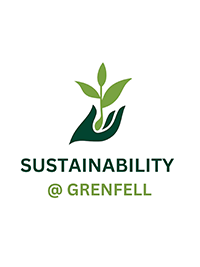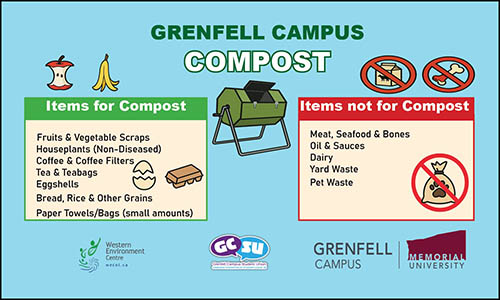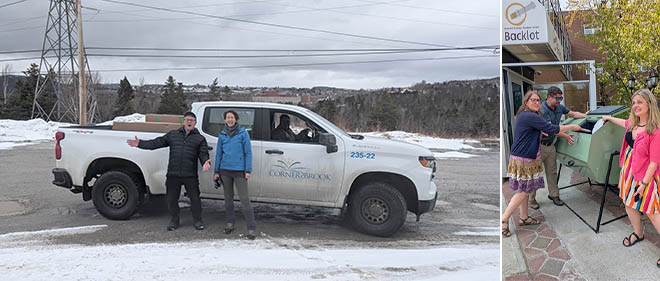Green Initiatives at Grenfell Campus
In 2025, a waste innovation working group comprised of faculty, staff, and students came together to advance waste reduction initiatives on campus, in partnership with local organizations and with the support of undergraduate MUCEP students and Graduate Assistants. Efforts to date include:
- Supporting the launch of Sustainability@Grenfell, a new student club
- Piloting a “swap shelf” with the GCSU for second-hand items during Fall Orientation 2025 and in November 2025
- Re-launching community composters on campus, in partnership with the Western Environment Centre
- Supporting a Custodial Services-led Bin-Free Space initiative to encourage faculty and staff to voluntarily remove individual garbage and recycling bins from their workspaces and use communal sorting stations
- Increasing signage in residences and across campus to promote proper waste sorting, recycling, and composting
- Implementing new sorting stations across campus to increase waste and recycling segregation and reduce the amount of waste going to landfill from campus
- Providing shredded paper to a local artist making paper, including for Grenfell’s Horseshoe Press
- Becoming a community partner for battery recycling with the national Call2Recycle program
Priorities for the 2025-26 academic year include supporting the student-led club and initiatives, rolling out and improving the new sorting stations based on monitoring feedback, advancing the custodian-led “bin-free space” initiative, monitoring and promoting composting, and engaging with additional stakeholders and partners in the community to improve recycling opportunities.
To join the student-led Sustainability@Grenfell club, sign up here or contact Victor Nwogo, student engagement lead (vkobasi@mun.ca). Follow along on Instagram: @SustainabilityGrenfell
To join the working group or discuss further, contact co-chairs Kaila Mintz, Innovation Coordinator (kmintz@mun.ca) and Dr. Josie Wittmer (jwittmer@mun.ca).
Sustainability@Grenfell
A new student club, Sustainability@Grenfell, now has official club status through the GCSU. They have piloted initiatives such as a Swap Shelf for incoming residence students during Orientation 2025, and are open to ideas. Follow them on Instagram (@SustainabilityGrenfell) and contact Victor Nwogo (vkobasi@mun.ca) for more information.

Community composting
In Spring 2025, the Western Environment Centre (WEC) generously donated two composters to Grenfell Campus, adding to the existing two. Campus volunteers helped WEC build the new composters, and Katie Temple, WEC’s Executive Director, joined a community BBQ at the Backlot to launch the composters and explain composting best practices.
These modern composters are part of Grenfell's efforts to reinstate a composting program, which now includes four exterior compost bin locations:
- Residence Complex
- Grove Cafeteria
- Library Building
- Courtyard near the Arts & Science Building
We encourage everyone to participate by bringing compostable items to these bins.
Here’s a quick guide to what can and cannot be composted:
✅ Items You Can Compost
- Fruit & vegetable scraps
- Houseplants (non-diseased)
- Coffee grounds & coffee filters
- Tea & paper teabags
- Eggshells
- Bread, rice, pasta, and other grains
- Paper towels, tissues, and paper bags (small amounts)
❌ Items You Cannot Compost
- Meat, seafood, and bones
- Oil and sauces
- Dairy products
- Yard waste
- Pet waste
- Plastic bags (including “compostable” ones)

- Consult the list above or posters (on each composter!) to separate compostable items from other waste
- Collect compostable items in your residence room or workspace in either a reusable, washable container or a repurposed plastic bag (e.g. bread bags or other food bags).
- Note: plastic bags, even those labelled “compostable,” cannot go in the composters! Garbage cans will soon be placed indoors near all composters.
- Empty items into the composters regularly to avoid odours.
- Pro tip: store your bin in a sealed container in a fridge or freezer to avoid any smells!
- If you can, give the composters a quick spin afterwards to help the breakdown process along!


Battery recycling
- Arts & Science Building: Crossroads (main floor)
-
Grenfell Campus Student Union (GCSU), Arts & Science Building
-
Forestry Building
Bin-Free Space initiative
Custodial Services developed a new waste collection initiative to minimize small single-use plastic bags. All faculty and staff were invited to participate during the pilot phase (ongoing through Fall 2025 semester). Participants volunteer gave up their small individual workstation garbage and recycling bins in favour of using shared office bins or centrally-located sorting stations around campus. This initiative aims to significantly reduce our campus’ reliance on single-use plastic bags / bin liners and improve our recycling capacity through better sorting, while encouraging more movement.
Did you know: in the 2024-2025 academic year, Grenfell Campus used upwards of 55,000 single-use plastic bags in its offices, classrooms, and open spaces!
How to participate:
New sorting stations were implemented, with clear signage and maps, in Fall 2025. Some of these sorting stations have expanded space for beverage containers, paper, mixed plastics and metals, e-waste, batteries... and even one for used pens! User-friendly maps are being developed and will be circulated in early 2026.
Waste Innovation Working Group members can come by to show units or individuals how the new sorting initiative will work and co-develop a plan for shared office bins. For example, group members worked with the Library to reduce the number of overall bins by half, which will now be centralized in 11 recycling locations.
Custodial staff will monitor waste and recycling accumulation regularly and make adjustments as needed. This pilot will be formally assessed each term.
For questions or feedback, or to schedule a consultation with the working group on shared office bins, contact Kaila, Innovation Coordinator, at kmintz@mun.ca. If you’d like to bring your bin back directly or pick up a Bin-Free Space label, visit the Facilities Management Office (AS280).
Resources